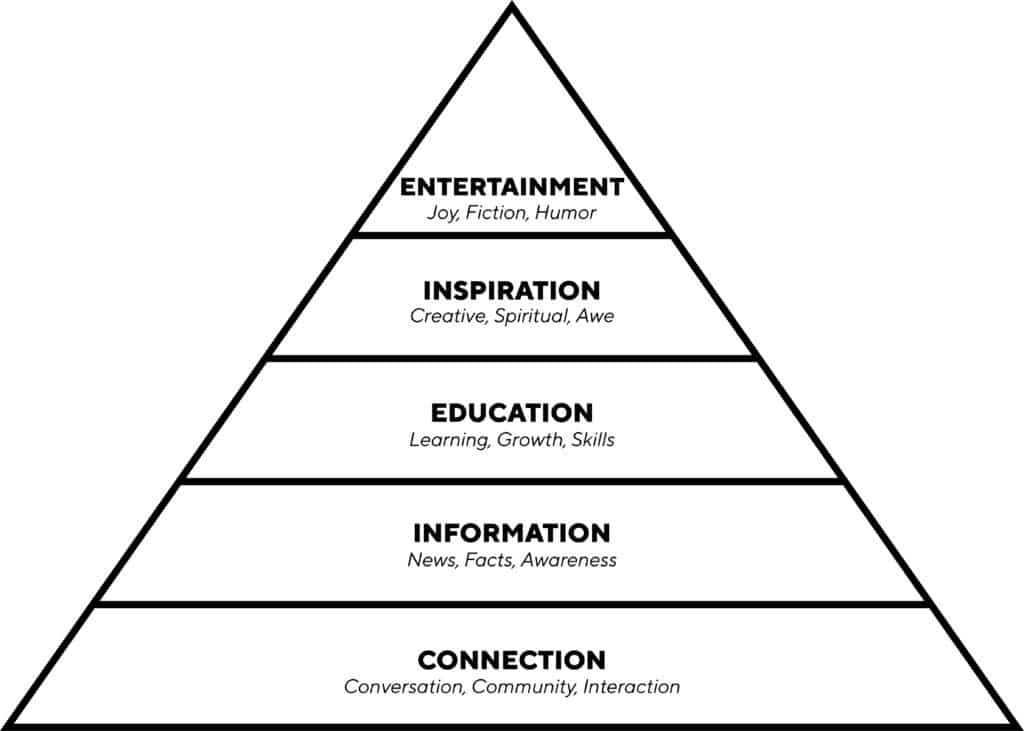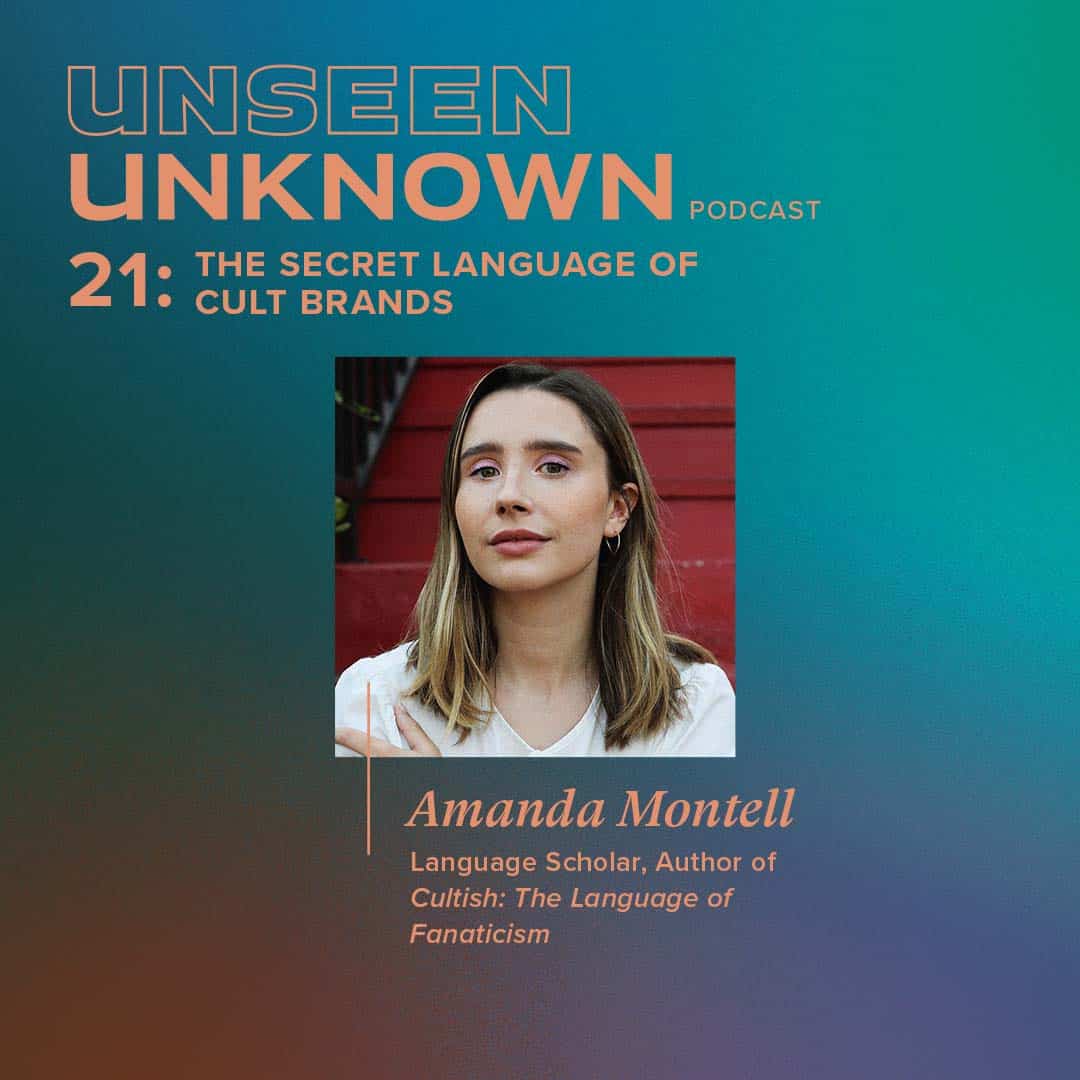In the business of strategy, you have to consume a lot of information. If you’re responsible for charting the course of a business or brand, then you’re responsible for understanding the world it lives within.
The most successful founders and investors are always the ones who are able to connect the dots before everyone else and cultivate high-conviction predictions of where the future is headed.
In large part, the success of a business is heavily informed by the information diets of its leaders.
In the English language, we think of ideas and information as food – “half-baked ideas,” “digesting information,” “food for thought” – so the metaphor of an “information diet” gives us a lot of intuitive jumping-off points to understand this world better.
When it comes to information, there’s little gap between what we consume and our perception of the world. When people talk about the world ending or techno-utopia, what they’re really telling you is what content they’ve been consuming and what corner of the algorithm they inhabit.
If physical diet is to blame for many of the physical health issues we face today, then our information diet should also be considered a contributor to our mental health issues. Research conducted during the COVID-19 pandemic found the news we seek and consume plays a powerful role in shaping our moods and can even contribute to conditions like depression and post-traumatic stress disorder. And there is an increasingly broad consensus of studies pointing to the stronghold social media consumption can have on our overall well-being.
This brings us to the question I’ve been considering: what is the ideal information diet? And how can strategists in particular develop a well-balanced palette?
The first observation is that information diets are to strategists what food diets are to weightlifters. Our consumption behaviors are highly atypical and are designed with a very specific goal in mind.
So, this isn’t just a question of who you should follow. It’s about your relationship with the content you consume and cultivating a structured approach to the information you invest your time in.
The Nutrition Facts of Information
In food, each nutrient is linked to a concrete physiological system in the body. We can similarly interpret the nutrition facts of information by looking at the systems that regulate our emotions and perceptions – our hormones.
Of all the hormones in the body, there are five that seem most responsible for our conscious perception of the world. These are our “macronutrients” – dopamine, serotonin, oxytocin, cortisol and adrenaline. (For simplicity I’m combining the effects of epinephrine and norepinephrine under adrenaline.)
Putting this into practice, here’s how we might better approach a more balanced information diet based on each of these hormones.

Understanding Our Diets
Laying out the information we consume this way starts to offer valuable insight.
We all generally have a good intuition of what “unhealthy” content looks like – attention-grabbing, sensational, intense – and we know all too well that too much of it can affect us negatively. What we don’t see as obviously is the harm from low-oxytocin content – think themes of distrust and discord or skepticism and conflict. This type of content is just as pervasive, but it affects us more subtly.
Unlike a spike in adrenaline or cortisol that is easy to observe, low-oxytocin content gradually adjusts our expectations of the kind of world we live in. Given enough engagement, it changes how we view our neighborhoods and our neighbors. It encourages us to be disconnected skeptics.
Sticking with low-oxytocin content also puts us at risk of missing the diverse nutrients from other types of information. The sort of valuable insights that make for successful strategists and leaders are not found where there is skepticism and conflict but where connection and trust are forming. The best insights come from finding what people are running towards, not away from. Those places show us where opportunities can be found.
People talk about how everyone is running away from alcohol, but more importantly, they’re running towards more meaningful gatherings and connections.
People talk about how everyone is running away from buying houses, but more importantly, they’re running towards a more present-focused mindset around goals, spending and experiences. A lot of people are choosing to be “forever-renters” not because they can’t afford a home but as an intentional response to an increasingly uncertain future.
In both cases, there’s far more noise in the negative story but far more value in understanding the positive one.
Focusing your diet on “healthy” information won’t just improve your mental state, it’ll expose you to much higher signal-to-noise content. Content that actually represents reality and progress, not just perceptions of doom and gloom.
When people are inciting fear, dread, or pessimism, they’re often looking to extract value from us. When people are optimistic and actively connected, it’s usually a constructive environment that is far more likely to add value. This is why it’s the optimists who make the money at the end of the day.
If you want to make this framework actionable, go through your typical information sources for 10 minutes and simply observe what hormones the content is designed to trigger. Remove the bottom 20-30% of content sources or creators from your channels, then make a list of the top five creators or sources of high-quality, healthy content. From now on, make a point to start any information consumption with one of those five.
The Food Groups of Information
Information nutrition is only one part of the picture. The genres of content we consume matter just as much, if not more. All information serves a function, so making sure the information we consume is serving us instead of using us is crucial.
So, how should we think about the types of information we consume? At the risk of significantly over-using this metaphor, the food pyramid offers us a helpful framework to structure our thinking.
We can break all information into five distinct functions: to inform, to entertain, to teach, to inspire or to connect. Broadly, this encompasses the full extent of the information landscape.
The information ‘food pyramid’:

For most of us, social media constitutes the majority of time spent consuming information, and depending on how you’ve trained your algorithm, you’ll get your own custom blend of these ingredients (likely with a heavy emphasis on entertainment). The one thing that social media does not provide us with, ironically, is meaningful connection.
Social media doesn’t let us actually absorb the information we consume. We’re blasted with low-context content and given no time to reflect on what we’ve just consumed before the next video starts to play. Functionally, it’s the same as junk food – we absorb the message straight into our psyche without vetting it, contextualizing it or reflecting on what we just consumed.
I recently watched a TikTok summarizing an article that was summarizing a documentary that was summarizing a trial. While there was some insight in there, it’s worth pausing and asking if this information is strategically valuable to me or if it is just interesting. Am I actually educating myself or just entertaining myself? Is this rare information or insight that will help me cultivate a deeper, valuable understanding or is it actually “junk food” for my brain? I didn’t get the chance to ask myself these questions in the moment, I just scrolled to the next video – and therein lies the truth.
What we ought to do instead is chew our food. Take the time to process the information, ideas and concepts on our screens. Would we be better served to consume less but process it more? I think so.
You might think a healthy information diet – especially one for a business leader or strategist – would have information at the bottom of the pyramid, but you’d be missing a crucial insight. Connection is how we process information.
When there’s a big event in the media, it’s our collective discussion of it that makes it make sense to us. If you want to really understand a category, you need to talk to the people in it – it’s only then that the truth will reveal itself.
Musician Brian Eno coined the term “scenius” to describe the collective intelligence of a whole community. Often, the geniuses we look back on in history were one part of a whole collective of people, it’s just that history is better at remembering names than groups. This cannot be emphasized enough: we’ve forgotten what made our heroes so great, which was the collective.
The point here is that, as a society, we seem to dramatically undervalue the importance of human connection as a way of understanding the world, much less centering it in our information diets.
As a strategist, if you want rare insight, you need to have access to rare perspectives and those come from people, not publications or posts on social media.
In business, a heuristic I’ve found to be very consistent is that you can measure the quality of a business’s leadership by how deeply they understand the people they serve and how much intuition they’ve built up from direct engagement with their audience. In the book Unreasonable Hospitality, Will Guidara talks about the all-too-common problem in organizations where the leadership has all of the authority but none of the insight and their staff have all of the insight but none of the authority.
The short of it is that when we think about information diets we might fixate on the quantity of information but ignore the quality and the processing of it. That’s like only looking at calories to determine if a diet is healthy. We need to have a higher-fidelity picture of the information we consume – our entire perception of reality relies upon it.
If you want to build deep insights, you need to cultivate deep sources. If you want to have original thoughts, you need to spend time thinking. It sounds obvious, but many of us fail to make time for anything other than just consuming content when we’re trying to get our information fill.
This thinking about developing an information diet was the driving inspiration behind building Exposure Therapy, Concept Bureau’s private community for strategic minds. Launching this community was an experiment to develop our own scenius and build a culture of connection around the information we consume.
Connecting with more than 60 other strategists, executives and founders from around the world – each tapped into unique facets of culture and the market – has created an incredible forum to go deeper and expand my radar of insights. It’s also been a fantastic opportunity to speak directly with a breadth of experts I would have never otherwise had the opportunity to connect with, from top-ranked pokers to conflict negotiators and financial therapists.
To become a genius, you have to build your scenius.
While launching or joining a community like Exposure Therapy is one example of an actionable application of this framework, you can also start small. Take 30 minutes every day to journal on an idea and explore its repercussions or deeper considerations. Then, go share those reflections with someone. If you don’t have someone to have that conversation with, spend 30 minutes instead reaching out to people who might be interested. This is the real practice of “digesting” our information.
Dieting Your Information
An idea I’ve been contemplating a lot recently is the virtue of ignorance. We know that being ignorant of everything is bad, but the opposite is true, too. To be hyper-aware of everything is terrible for our mental health, unnecessary and also impossible. So, it’s safe to admit to ourselves that some level of ignorance is good for our information diets. The question is: how much?
The law of diminishing returns is a helpful guide here. For every hour I educate myself on a given topic I’m learning fewer new things. During the first hour I spend understanding game theory or Bronze Age history I’m exposed to tons of new ideas, but during the 10th or 100th hour I’m learning far less. Thinking this way, there are two types of knowledge: the breadth of our awareness and the depth of our awareness within each topic.
The challenge as a strategist or leader is that you never truly know where valuable insights come from. Our tangents, side quests or personal passions often lead to the most influential ideas.
When you look at our most influential leaders, they all have one thing in common: a “T-shaped” knowledge graph. They’re in the top few percentile in terms of depth of knowledge in a certain field, but they also have a much broader awareness of things in the world than most.
If the value of insights is proportional to their rarity then being in the top 5% of depth in a specific field and the top 5% in breadth of awareness means you’re maximizing your surface area of valuable insights.
For most, our information diets are closer to resembling a square – we know an average amount of things about an average number of topics. We’re closer to 50% in the breadth and depth of what we consume. The danger in this information diet is that we’ll never see what others don’t because we’re simply not looking in places that others aren’t.
Building a T-shaped knowledge graph means aggressively diversifying your information sources, spreading out wider to seemingly unrelated areas and capturing the advantage of being at the beginning of the diminishing returns curve where you’re constantly exposed to new ideas. It also means being selectively ignorant about certain things. You have to critically evaluate what you consume and choose to place novelty over familiarity. In the few areas you don’t want to be ignorant about, go all the way in by reading lesser-known books, talking to the experts and cultivating your own original thinking through reflections and conversations.
This is what curiosity looks like – making yourself at home in novelty and constantly seeking new connections. Yes, it comes at the tradeoff of depth in other areas, but the leverage gained by not going too deep in depreciating returns means the amount of extra exposure you get is well worth the cost.
The ability to recontextualize old ideas in new ways is the magic of coupling diversity and depth in an information diet. Think of Steve Jobs and how his interest in calligraphy went on to be deeply influential in the philosophy of Apple, a perfect example of how taking mental models and learnings from seemingly unrelated disciplines can unlock new insights. After all, that is pretty much the definition of innovation.
Putting It Into Practice
Building a high-performance information diet requires more effort than your physical diet. It means being mindful of how the information you consume affects you, focusing on connection and reflection over just consumption and prioritizing the diversity and rarity of where your insights come from. Do this and you’ll gain a whole new vantage point on the world.
While I’ve provided you with some actionable steps to begin developing your unique diet, I’ll leave you with one last appeal to find a community that can help you identify and meet your nutritional needs. Make a deliberate practice of connecting with individuals and building collective wisdom. After all, food is best enjoyed in good company.


